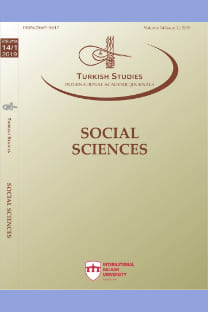Türk Öğrencilerinin Başarısını Negatif Etkileyen Faktörler: Cinsiyete Dayalı bir Araştırma Çalışması
Türk okullarında okuyan öğrencilerin yabancı dil alanındaki başarılarının zayıf olmasının nedenlerieğitimciler arasında uzun süredir tartışmalara konu olmuştur. Bu başarısızlık Türk öğrencilerinin, ilkokuldanlise sonuna kadar İngilizce öğrenmeye uzun yıllar harcadığı gerçeğinden kaynaklanmaktadır. Bu uzun süreyerağmen, öğrencilerin İngilizce alanındaki doğruluk ve akıcılığının zayıf şekilde geliştiğine ve ciddi şekildeyetersiz olduğuna inanılmaktadır. Aslında, öğrencilerin birçoğu temel konuşma seviyesini sürdürememekteve hatta başlatmak için beklenen iletişim seviyesine ulaşamamaktadır. Bu kaçınılmaz gerçek, bir gruparaştırmacıya göre; yetersiz öğretim planlama ve gerçek İngilizce'ye maruz kalma eksikliğinden, dil öğretmenlerinin yetersizliğinden ve öğrenci ilgisinin ve motivasyonun eksikliğinden, gibi çeşitli sebeplerdenkaynaklanmaktadır. Bu amaç ile yola çıkarak bu araştırma; İngilizceyi yabancı dil olarak öğrenen üniversiteöğrencilerinin bu başarısızlığa ilişkin düsüncelerini araştırmış, Türk öğrencilerinin İngilizce öğrenmedekizayıf performanslarında rol oynayan değişkenlerin iki gruba ayrılabileceği sorusunu cevaplamaya çalışmıştır.Çalışma, Türkiye'deki farklı özel ve devlet üniversitelerinde okuyan ve rastgele seçilen 56 adet İngilizceyiyabancı dil olarak öğrenen öğrenci ile gerçekleştirilmiştir. Bu çalışma için veriler geliştirilen anketaracılığıyla toplanmıştır. Korelasyon matrisi için belirleme katsayısı, çoğunlukla .5'ten büyük ters-görüntükorelasyon matrisi diagonal değerleri ile anlamlı bulunmuştur. Erkek ve kız öğrencilerin sınıflarındakiperformanslarını olumsuz etkileyen değişkenler ile aynı şekilde düşünüp düşünmediklerini görmek için birtakip analizi de yapılmıştır. Farklı bir ifadeyle, erkekler ve kadınlar öğrenmelerine zarar veren değişkenlerefarklı miktarlarda önem vermekte, erkekler birkaç değişkene karşı son derece duyarlı davranmakta fakatkızlar başarısızlıklarını daha geniş bir değişken aralığına bağlamaktadırlar.
Factors Negatively Affecting Turkish EFL Learners' Achievement: A Gender-BasedExploratory Study
The reasons for the Turkish students' poor foreign language achievements have long been a subject of discussion among educators. This is owing to the fact that Turkish students spend many years on learning English, starting from the primary school to the end of the high school. However, the accuracy and fluency of the majority are believed to remain poorly developed and seriously flawed. In fact, most of them cannot reach the desired communicative level to carry on or even start basic level of conversations. This unenviable reputation has been attributed by a group of scholars to a variety of factors, ranging from the lack of authentic language input and poor instructional planning to the inadequacy of language teachers, lack of student interest and motivation to name a few. To this end, to contribute to some in-depth perspectives on English language teaching (ELT) students' perception on this failure, this study sought to answer the question of whether the variables playing a role in Turkish EFL learners’ poor performance in learning English could be put into two major groups. The study was conducted with 56 undergraduate ELT students who were randomly selected from the total population of Turkish ELT students studying at different private and state universities in Turkey. The data was gathered through the questionnaire that was developed for the purpose of the current study. Results indicated the KMO measure of sampling adequacy for 2 factors was .54 with the Bartlett’s test of sphericity being significant (p < 001). The coefficient of determination for the correlation matrix was also significant with the anti-image correlation matrix diagonal values larger than .5 for the most part. A follow-up analysis was also conducted to see if male and female learners think in the same way as regards variables adversely influencing their performance in EFL classes. To put it still differently, males and females attribute different amounts of importance to variables detrimental to their learning with males extremely sensitive to a few of them and with females attributing their failure to a wider range of variables.
___
- Can, E., & Can, C. I. (2014). Türkiye’de ikinci yabancı dil öğretiminde karşılaşılan sorunlar [Problems encountered in second foreign language teaching in Turkey]. Trakya University Journal of Education, 4(2), 43-63.
- Çelebi, M. D. (2006). Türkiye’de anadili eğitimi ve yabancı dil öğretimi [Education of mother tongue and teaching foreign language in Turkey]. Erciyes Üniversitesi Sosyal Bilimler Enstitüsü Dergisi, 21(2), 285-307.
- Celik, S., & Kasapoglu, H. (2014). Implementing the recent curricular changes to English language instruction in Turkey: Opinions and concerns of elementary school administrators. South African Journal of Education, 34(2), 1-14. https://doi.org/10.15700/201412071144
- Gok Catal, O., Sahin, H., & Celik. F. (2018). 6, 7 ve 8. sınıflarda İngilizce öğrenme sürecinde karşılaşılan sorunların incelenmesi [An examination of problems encountered in the process of learning English in 6th, 7th and 8th grades], Mehmet Akif Ersoy Üniversitesi Eğitim Fakültesi Dergisi, 47, 123-136. https://doi.org/10.21764/maeuefd.361675
- Isik, A. (2008). Yabanci dil eğitimimizdeki yanlışlar nereden kaynaklanıyor? [Where do the mistakes in our foreign language education come from?]. Journal of Language and Linguistics, 4(2), 15-26.
- Karahan, F. (2007). Language attitudes of Turkish students towards the English language and its use in Turkish context. Journal of Arts and Sciences, 7, 73-87.
- Kizildag, A. (2009). Dialogues with teachers about the challenges in public primary schools. International Electronic Journal of Elementary Education, 1(3), 188-201.
- Kiziltan, N., & Atli, I. (2013). Turkish young language learners’ attitudes towards English. Hacettepe University Journal of Education, 28(2), 266-278.
- Oguz, E. (1999). İlköğretimde Yabancı Dil (İngilizce) Öğretimi Sorunları [The Problems of foreign (English) language teaching in elementary schools] (Unpublished master dissertation). Institute of Social Sciences, Kocaeli: Kocaeli University.
- Tilfarlioglu, F. Y. & Ozturk, A. R. (2007). An Analysis of ELT teachers’ perceptions of some problems concerning the implementation of English language teaching curricula in elementary schools. Journal of Language and Linguistic Studies, 3(1), 202-217.
- Yurtsever Bodur, G., & Arikan, A., (2017). Why can’t we learn English? Students’ opinions at Akdeniz University, Gaziantep University Journal of Educational Sciences, 1 (1), 1-7.
- ISSN: 2667-5617
- Yayın Aralığı: Yılda 6 Sayı
- Başlangıç: 2006
- Yayıncı: ASOS Eğitim Bilişim Danışmanlık Otomasyon Yayıncılık Reklam Sanayi ve Ticaret LTD ŞTİ
Sayıdaki Diğer Makaleler
İki Dünya Arasında Bir Elçi: İvan Daniloviç Hohlov'un Buhara Misyonu (1620-1622)
Sporcuların Sportif İmgeleme Düzeylerinin İncelenmesi
Organizational Ecology Approach in Hotel Organizations in the Aspect of Generalists and Specialists
Kapadokya’ya Yönelik Algılar: Bir Metafor Analizi
İnanç Turizmi Bağlamında Nasreddin Hoca ve Akşehir
Esra AYDIN GÖKTEPE, Pervin TUNÇ, OSMAN YILDIRIM, Selçuk ÇAPUK
